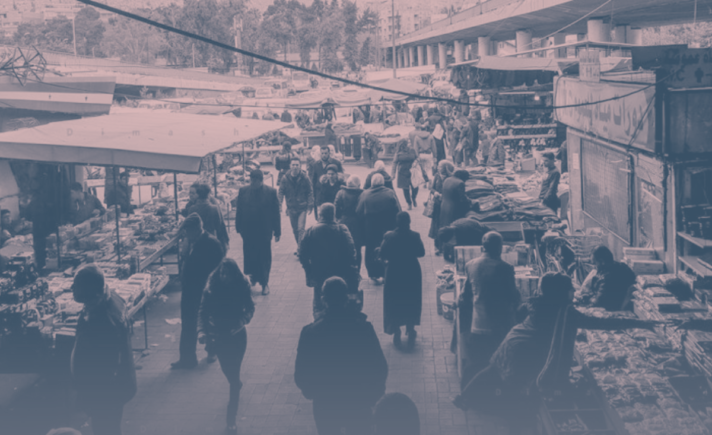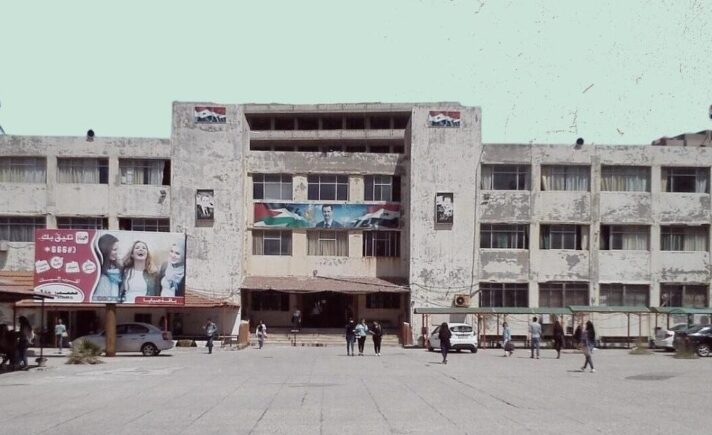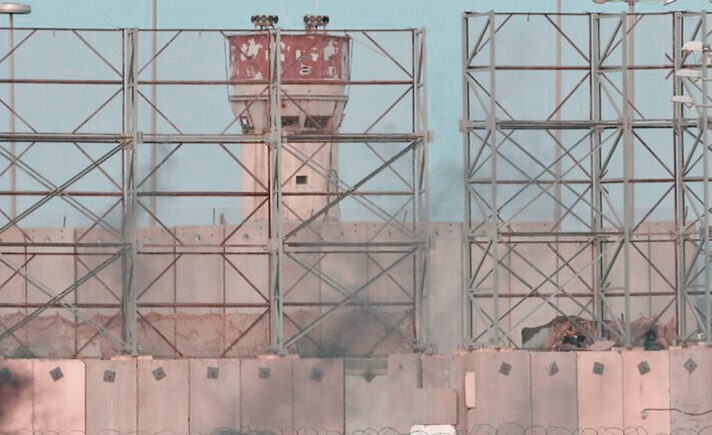“… So, Asma al-Assad brings in a silver-colored aluminum tray, on which is a plate of fried eggs with meat, a dish of blood-red chopped tomatoes with salt sprinkled on top, a folded loaf of flatbread and a cup of tea. She tells me: ‘Be my guest, Abu Khalid.’ She then steps away, and fixes her gaze at me from a distance, carrying Sham, her daughter, and trying to hush her cries to no avail. She grips her daughter’s mouth shut, warning her ‘Stop it… your dad might come in at any minute.’ I dust off my overalls, carry Sham, pronounce the name of God and praise Him in her ears. She falls asleep in my arms. I return Sham to her mother and get back to tiling the kitchen floor in the house of Bashar al-Assad.”
This is how Abu Khalid’s tales of his cosmic adventures usually go, as crowds of people from the neighborhood gather around him, feigning belief for no other purpose than to hear more of his tales.
Most of the residents of that Aleppan slum had been displaced, first during the battles of liberation in 2012, after which they returned to resume their lives. Then ensued the second displacement, following the advance of regime forces toward Brigade 80 east of Aleppo, accompanied by Shiite militias, in early 2014. The regime had horrendously intensified its use of barrel bombs, forcing most of the neighborhood’s residents to leave after nearly a year of liberty and improved life conditions. After this wave of displacement towards the countryside and Turkey, only some cats remain steadfast in the neighborhood alongside the Free Syrian Army fighters. Additionally, there are those too destitute to travel, and those who experienced displacement the first time around, tasted the humiliation in refugee camps and swore to starve to death under the roof of their homes before being filmed during a distribution of food aid baskets.
“We had filled nylon bags with water and hung them on the ceilings, so that flies would leave us alone. We eventually left our homes and yet the flies remained,” said a fellow from the neighborhood in a WhatsApp message to me.
My sleep cycle ceased to be linked to the sunrise or sunset, but rather to the presence of gasoline in the electric generator. When the generator runs out of gasoline, and the internet goes down in turn, then it is my time to sleep. As the sun rises, the resonance of Abu Khalid’s wooden walking cane hitting the dilapidated walls of the alley awakens me.
He pleads with the absent homeowners to return, mentioning each by his name: “Oh Khuleif, oh Abu Hussein… I adjure you, by the virtue of this fine morning and folded Qurans, to return to us by evening.” He heads to my media desk, stands at a distance he deems reasonable, and asks Ammar, my neighbor, to wake me up so I could inform him of the latest world news.
Abu Khalid had heard that Assad army helicopters could spot the tag on a man’s shirt. This is why he comes to see me before eight in the morning, that is, before pilots begin their daily routine of bombing the liberated neighborhoods of Aleppo. He is afraid of being spotted with me by a helicopter, which might result in immediate bombing of his home.
He returns to the stone house he had built with his hands in his youth back in the seventies. He clutches his fist as he narrates to us how he built his house. He makes us tea with a fire he kindled using a pair of pants, or an old shoe of his or his neighbor’s. The air pressure released by barrel explosions has opened closed doors, helping Abu Khalid make use of shoes from neighboring houses. “Why did you enter the house of so-and-so?” we casually scold him. He replies sarcastically: “If he were to return I will grant him ten shoes instead of one… that is if he returns.”
After each of his tea parties, Abu Khalid would tell us the tale of said pants: When he bought them, for what purpose and for how much; or: from which house these pants hailed, their owner’s story and their past, when and how they moved to the neighborhood, and to which clan the wife belongs.
We drink tea under the balcony of his house as not to be seen by that helicopter, as pilots can also spot the glitter of the teapot under the sunrays. Those who had witnessed the massacres of the eighties of the last century still believe that the Assad regime can hear their discreet talks and private conversations, and that murder and execution could be grounded in nothing more than hidden thoughts.
Abu Khalid recalls that a while back, the pilot intended to bomb al-Hawouz Square in Aleppo when he saw an FSA car carrying a DShK heavy machine gun. Once he pointed at the aim, he saw a civilian car carrying citizens heading to the countryside and workers who have nothing to do with this war. The DShK car had already passed and it was over. So before he pushed the missile button, he pulled the “handbrake” on his heli, returning to the airbase without bombing anyone.
“Man they do no wrong to anyone… they do not,” he said loudly hoping that the pilot hears him and refrains from bombing his house. The aim of all his theories and the tales he weaves in dark nights is but to avoid having his house bombed.
Back then, I used to start my day by tracking military planes while mounting my bike. I identify the direction of the plane and estimate the possible projection of the barrel bomb. I then arrive on site to photograph the corpses and the devastated homes. Wherever the helicopter went, I would follow it, lifting my head towards the sky lest it elude me.
Among those hovering in the skies of the liberated neighborhoods, I track the plane assigned for me. There were three of us – activists, working for a media center, each assigned his own plane to track, depending on the geographical distribution of the sky over the liberated neighborhoods. My shift ends at sunset, as by then my camera’s external memory is usually exhausted. On my way back home, I buy a potato sandwich from Sharq Chicken, I eat it and continue my way through the streets. In the light of a battery torch I utilize to dodge the potholes caused by barrel bombs, I bike diagonally like a “zikzak.” I amuse myself with my shouts echoing against the walls of abandoned houses. I arrive home, turn on the electrical generator, upload the videos and pictures I took to the Dropbox folder shared with the main media office.
The voices of Abu Khalid and Shu’ayla –his wife– break my preoccupation with uploading the videos.
They have a strange love affair. He may slap her on the right cheek, only to kiss the left cheek sooner than his palm cools from the slap. He yells at her for not bringing a glass of water closer to the dinner table, which is nothing more than a dish of olives and thyme with vegetable oil!
He reminds her of their marriage story, and how her parents said to him: “You marry her and her inheritance would be yours.”
She responds: “Had it not for my brother being a police officer you would not have married me,” to which he replies: “And now your brother is retired… so off to your family home you go, I don’t need you any longer.”
To what family is he referring? Half of her family have passed away and the other half are homeless, while she has exceeded sixty years of age.
Ammar and I arrive to him, offering him water. He ceases his yelling and tells us one of his cosmic adventure stories: how he entered the occupied Golan Heights by mistake after he lost his way, before the Zionist state drove him out to Jordan, and he had to find his way back to Syria by land.
As I approach my home, Abu Khaled advises me to seal my window with a dark cover, lest the pilot see the light escaping the room. “The pilot would thus suppose that the residents of this house are displaced,” he tries to convince me.
I try to read what is at hand from my college textbooks that I have neglected since the liberation of the city in the summer of 2012. I close the textbook, try to sleep, but I toss and turn. The sounds of clashes in the proximity of the Nairab military airbase get louder. Gun shots from a shilka machine gun hit the wall of my neighbor’s house. I hide from the shots under my green sheets. I contemplate: what if the sheets became dirty in case the house got bombed? My mom might yell at me because she had cleaned them before her displacement.
Thinking about the sheets and the dust is merely an attempt to evade the sounds of the clashes. I hold a handmade explosive in my hand, made from a shilka cartridge casing gifted to me by Ammar, my dear neighbor. My hand sweats. I have no clue how to use this thing. I continue to ignore the messages from my parents, asking me to return to Raqqa.
I conjure up images from my future. A strange knocking on the door interrupts me. I open the door, which is pushed inward by Abu Khalid’s hand. He hastily closes the door behind him and grabs my shoulder with his hand, which feels like an old tree bark:
“I am alone, son, and loneliness has all but killed me… my sons have left me… don’t leave me alone, I beg you.”








